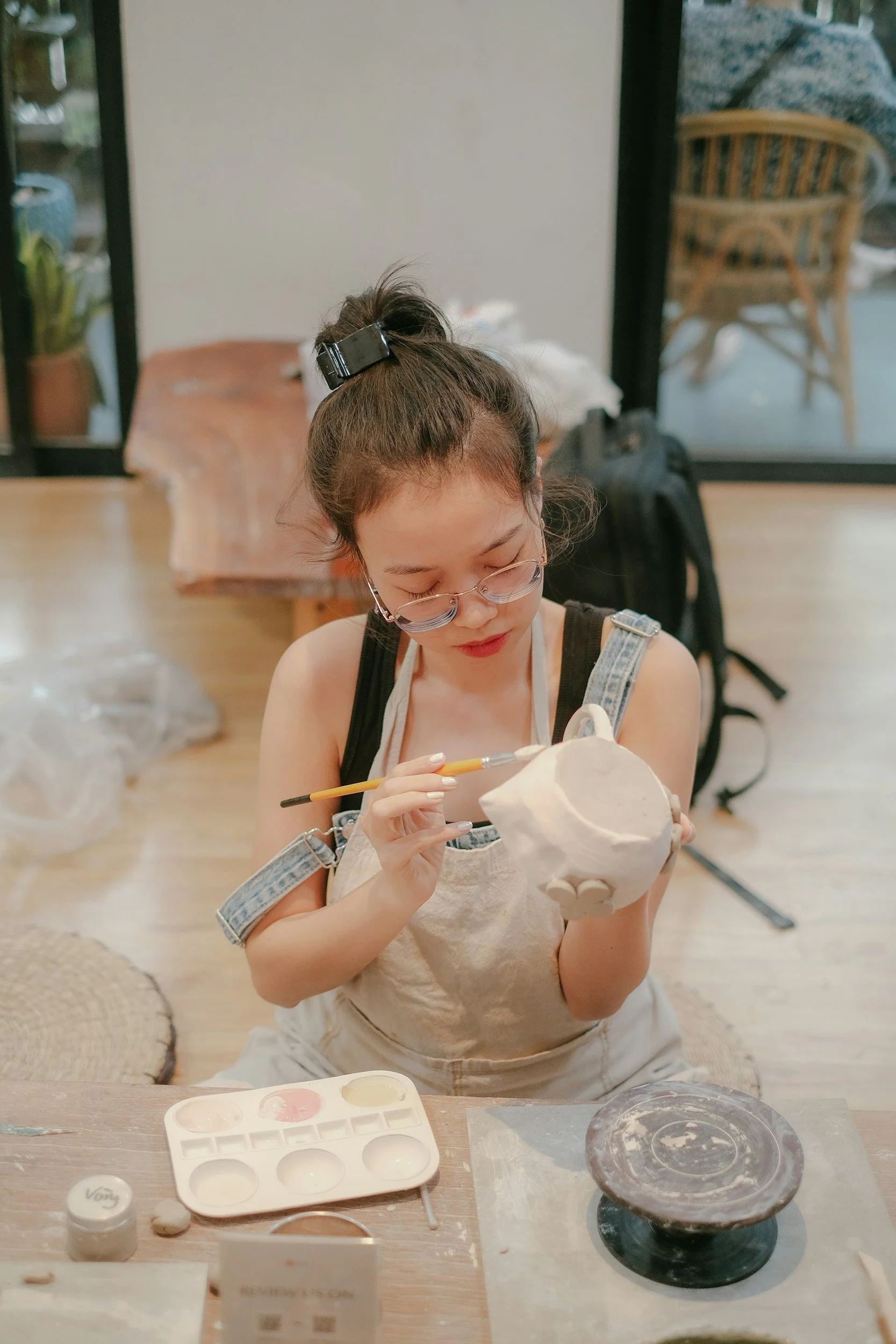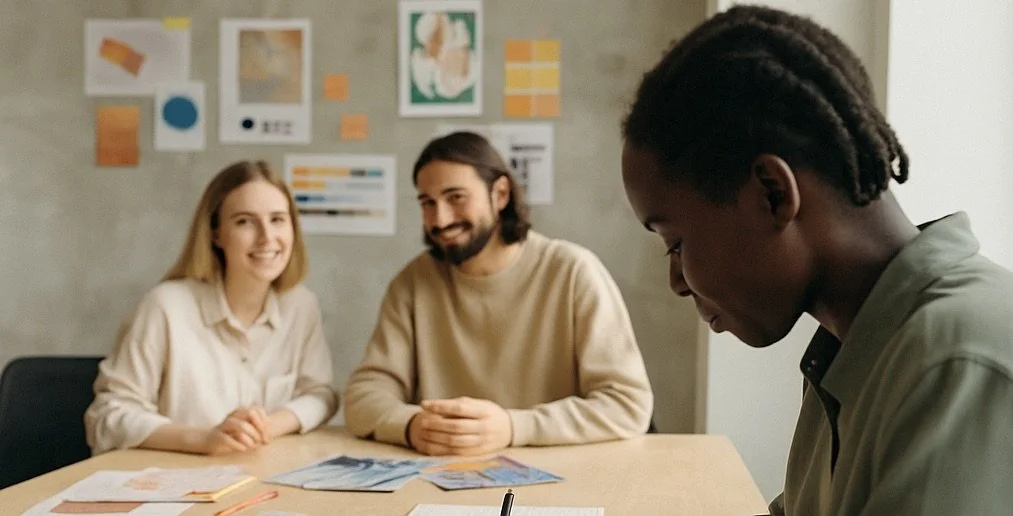Three Ways Creatives Can Diversify Their Income (That Aren’t Just Prints)
For many creatives, "making money from your art" is immediately linked to one thing: selling prints. It’s often the go-to advice shared online: turn your work into prints, open an online shop, and hope for sales. And yes, prints can be a wonderful part of a creative business — they make your work more accessible, help you reach new audiences, and build recognition.
Platforms like Etsy, INPRNT, and local art markets have made it easier than ever to start. But print sales often rely on volume — which can mean lower pricing, constant promotion, and tight profit margins. Fees, packaging costs, and shipping logistics can quickly eat into your earnings.
Prints can absolutely be part of your income — especially when they’re thoughtfully priced and paired with higher-value offers — but they don’t have to carry the whole weight of your business.
The good news is that prints aren’t your only option. In fact, building a creative business that feels sustainable, flexible, and true to your strengths means thinking beyond the usual models.
After over two decades in the industry — running an international consultancy, mentoring emerging artists, and building my own creative practice — I've seen how diversifying income can give creatives breathing room, clarity, and creative freedom.
Here are three powerful, practical alternatives to consider. They don’t require huge audiences or perfect websites. Just a willingness to value what you already know, and build from there.
1. Creative Services: Teaching, Mentoring & Skill-Sharing
One of the most underestimated income streams for creatives is sharing what you know.
You don’t need to be a certified teacher or have decades of experience to guide others. If you've developed a skill, figured out a process, or learned through trial and error, you're in a position to help someone else.
What this might look like:
Teaching short in-person or online workshops
Hosting creative sessions in your studio or community spaces
Offering 1:1 mentoring, portfolio reviews, or creative coaching
Leading sessions on confidence, mindset, or navigating a creative career
Workshops can be as small as 5 people around a kitchen table. Mentoring might mean one session a month with someone starting out. The scale is up to you.
How it helps build a sustainable practice:
Creates connection and positions you as a guide
Brings in income between exhibitions, launches, or commissions
Reminds you that your experience has value
Helps you stay connected to your own learning and growth
A mindset shift:
You don’t have to be the finished product to support others. You just need to be willing to share honestly.
2. Commissions & Custom Projects — With Boundaries
Commissions can be a powerful way to generate income — especially for creatives who enjoy personal connection and bespoke work. But they’re also one of the easiest ways to burn out if you don’t set clear boundaries.
Done well, commissions can:
Create deep connections with buyers or clients
Allow you to explore ideas collaboratively
Offer high-value, well-paid work that fits your schedule
But too many creatives fall into the trap of unclear timelines, shifting expectations, and emotional exhaustion. That’s why structure is key.
What helps:
Clear pricing (e.g. base fee + extras)
A welcome guide or FAQ outlining your process
Limits on revisions, timelines, and types of requests
A client agreement or simple contract
“I worked with a painter who used to accept commissions on an ad hoc basis. She now only takes 3 commissions per year, booked through a simple waitlist. Each one is clear, priced to reflect the time and energy involved, and feels aligned with her practice.
You don’t have to take on every request. You don’t have to keep commissions open all year. You get to design your offer.”
A mindset shift:
Commissions aren’t about being endlessly available. They’re about creating on your terms, for the right people.
3. Collaborations & Paid Creative Roles
Consider exploring creative collaborations and paid roles within arts organisations, charities, and nonprofits. These types of partnerships and positions can offer both stability and purpose — especially for creatives who enjoy working with others or supporting community-focused projects.
Opportunities to explore:
Collaborating with local makers or independent brands on one-off or seasonal products
Applying for part-time creative roles at arts charities, CICs, or cultural institutions
Taking on project-based roles like community engagement, event coordination, or education
Running creative workshops for funded programmes or well-being initiatives
Paid roles in the arts don't have to replace your practice — they can support it. Many creatives build a hybrid model: part freelance, part employed, part passion project.
“ One artist I worked with took on a part-time role at an arts charity supporting underserved communities. It offered regular income, creative purpose, and the flexibility to continue developing her own work.
These roles are often advertised via local arts councils, networks, and creative job boards — and sometimes just by word of mouth. If you’re already doing this work voluntarily, ask about paid opportunities or funding options.”
A mindset shift:
It’s still a creative career even if it doesn’t look like full-time studio work. Paid roles in the sector are part of the ecosystem — and your contribution matters.
Bonus Idea: Digital Resources & Creative Assets
Have you already made guides, templates, worksheets, or planning tools for yourself? Those same resources might support others.
Think about:
A downloadable zine on your creative process
A PDF mini-guide on how you prep for an exhibition
A checklist for pricing your work or writing an artist bio
A digital collage pack, brush set, or prompt deck
These can be low-lift, affordable, and scalable. They can also be a beautiful way to share your voice, process, and values with a wider audience.
You don’t need to become a content creator — just share what’s already working for you.
Final Thoughts: Building With Intention, Not Urgency
Diversifying your income as a creative doesn’t mean doing everything. It means finding your version of sustainable. The mix that suits your energy, your season of life, your creative direction.
Start with one offer.
Let it be simple.
Let it be imperfect.
Refine it as you go.
This isn’t about building an empire. It’s about building a business that supports the life and practice you actually want.
And if you’re not sure where to start — or you have too many ideas and no clear way forward — this is exactly what mentoring can help with.
I work with creatives who are ready to take the next step, but want to do it on their own terms. Less overwhelm, more clarity. Fewer formulas, more alignment.
Want support shaping your income streams?
I help creatives build sustainable businesses without losing the soul of their practice.
Book your free 30-minute discovery call
Ophelia Art Mentoring & Business Coaching
Practical support for creative business. Grounded guidance, clear action, no pressure.


